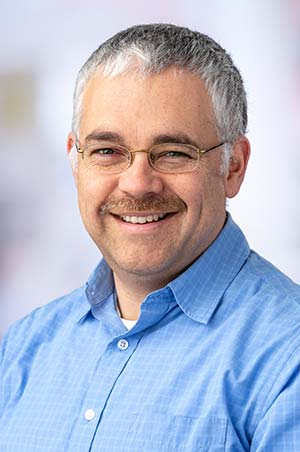
Faculty Spotlight: Dr. Johnnie Orozco
Dr. Johnnie Orozco is an assistant professor in the Division of Medical Oncology and a physician-scientist at the Fred Hutch Cancer Research Center. Orozco takes care of patients with leukemia, lymphoma or multiple myeloma, while he and his lab conduct translational research on improving cancer outcomes and reducing the harmful effects of systemic therapies for these patients.
One such innovation pioneered by investigators at The Hutch and The Orozco Lab is radioimmunotherapy, a procedure that delivers targeted radiation to cancer cells.
The lab has been awarded a $3.4 million grant by the NIH to investigate how radioimmunotherapy can be delivered along with therapeutic drugs to target acute myeloid leukemia (AML) cells while protecting healthy cells.
The team has recently published their findings of a two-step pre-targeted RIT (PRIT) solution, administering bispecific antibodies or proteins that bind to cancer cells prior to the radioisotope that attaches to the cancer target. The procedure shows improved outcomes in preclinical models of AML while reducing levels of toxicity on neighboring cells and overall stress on the body that can result from full-body radiation.
For many AML patients, the preferred treatment method with the highest likelihood of a cure, is a bone marrow transplant. However, many patients – often those from racial and ethnic minorities - cannot find a fully matched bone marrow donor.
“According to a report from the National Marrow Donor Program/Be the Match registry, which helps U.S. transplant patients find donors, a white patient of European descent has a 75% chance of finding a matched donor. But a Black patient with Central or South American background only has a 16% chance.” (Fred Hutch)
Grappling with this reality for patients of color, Orozco and his team are further seeking to evaluate how this combination therapy can offer a treatment option for “partially-matched” transplants.
"Using haploidentical, or “half-matched” donors, is important to me," says Orozco, "because ethnic minority patients often struggle to find a fully matched donor, but all patients will have a parent, sibling or child that can be a haploidentical donors."
In addition to his clinical and research activities, Orozco is equally dedicated to improving inclusion in the medical profession at the Fred Hutch and University of Washington. Orozco is a member of a group working to increase representation amongst the faculty at Fred Hutch by recruiting scientists from diverse backgrounds to contribute to the goal of eliminating cancer, infectious diseases, and understanding mechanisms of disease.
Orozco is also the chair of the University of Washington School of Medicine Committee on Minority Faculty Advancement, a group who works to highlight the needs of faculty from under represented backgrounds and provide support, opportunities and resources necessary to succeed in academic medicine.
“I’m also excited to work with Dr. Kemi Doll, newly appointed Director of URMS Faculty Development within the UWSOM Office of Faculty Development.” Faculty of color face additional challenges in navigating the expectations of academic medicine, while also staying connected to our communities via mentoring current and aspiring trainees from underrepresented backgrounds.
“In her new role, Dr. Doll has an exciting vision to support minority faculty to thrive, not just survive at the School of Medicine. With input from CMFA and faculty of color across the SOM, we will identify key elements to ensure a supportive environment and programming for minority faculty.”
The drive to improve access to clinical treatments and to promote the success and inclusion of diverse faculty members is not only to the benefit of patients and the medical profession in general, but it is an intrinsic value for Orozco himself. From the advances he has experienced in his research to the progress he has helped bring about in the medical environment, each holds special significance.
"As someone who grew up in ‘los one ways’, a barrio outside of Los Angeles plagued by gangs, drugs and violence, I feel like every milestone is a huge achievement, given what the statistics would otherwise predict for someone like me," says Orozco.
"In fact, I’m still celebrating my first R grant awarded in June 2020 from the NIH! Nonetheless, the further I climb the less representation I see at my ranks, so each accomplishment is a reminder of the outreach, mentoring and EDI work that needs to happen so we can increase representation to facilitate more creative solutions."
For all he does for the UW and Fred Hutch communities, his work-life balance is struck by prioritizing quality time with his family. With COVID-19 keeping all of us at home more than ever, Orozco and his family are making the most of it.
"I have a 15yo in high school, a 12yo in middle school, and the 7yo in elementary school. My wife is also in medicine and works in a community health clinic, so it’s really hard to find time where we can all overlap and do fun things. It’s fun to go out and take day trips, but with the current stay-at-home lifestyle, we still enjoy board and video games. I love our “Just Dance” challenges!"
Orozco is an alumnus of the University of Washington School of Medicine, having received his MD after earning his PhD at the UW in Bioengineering. Orozco has appointments in the Department of Medicine at the UWSOM, in the Clinical Research Division at the Fred Hutchinson Cancer Research Center and a clinical appointment at the Seattle Cancer Care Alliance.